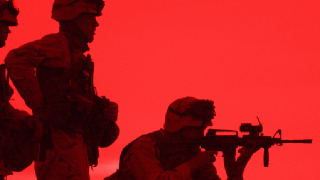
ARMS TRADING - RED
The UK continues to sell arms to regimes despite credible allegations of recipients' involvement in war crimes and the corresponding damage to the Arms Trade Treaty.
This scorecard assesses the UK's performance on key areas using impartial sources. Applying our methodology, we scored the UK red as its actions are undermining the rules-based international system.
Our rationale
In 2018, a UN Report on Yemen called on the international community to “refrain from providing arms that could be used in the conflict”. Two years earlier, two cross-party UK parliamentary committees made similar recommendations, calling for the UK to “suspend licences for arms exports to Saudi Arabia, capable of being used in Yemen”. The UK has so far ignored these calls, and in doing so, is damaging key elements of the rules-based system, including the Arms Trade Treaty.
Our analysis
Despite its obligations under the Arms Trade Treaty (ATT) not to supply weapons that could be used to facilitate a serious violation of international humanitarian and human rights law, the UK has become the second-largest global defence exporter, largely through the sale of arms to countries the UK itself has labelled “human rights priorities”.
Since the start of the Saudi-led intervention in Yemen in 2015, the UK Government has licensed the sale of more than £6.9bn of arms exports to that country. Saudi Arabia and the United Arab Emirates—another significant UK arms trade partner—have been repeatedly accused by independent UN reports of violating international humanitarian law, including most recently by the UN Group of Experts on Yemen who stated that the coalition’s attacks “may amount to war crimes”.
The UN says the conflict has precipitated the “world’s worst humanitarian disaster”. A conservative estimate for civilian deaths caused by fighting between March 2015 and June 2018 is 6,475 - the majority by the Saudi-led coalition. The broader fallout is eyewatering: 50,000 children died in 2017- 130 every day. 75 per cent of the Yemen’s population need humanitarian assistance. Over two million children remain out of school.
In June 2019 the UK Court of Appeal ruled in Campaign Against the Arms Trade's favour that the granting of export licences to for arms exports to Saudi Arabia for use in Yemen were illegal. The historic ruling required the UK to "retake" all decisions to export arms to Saudi Arabia with proper consideration as to whether violations of international humanitarian were taking place in Yemen and to the meantime to stop issuing new arms export licences to Saudi Arabia. During this period the then Secretary of State with responsibility for approving export licences, Liz Truss, admitted to repeatedly violating the Appeal Court judgement by approving new licences for weapons which could be used to commit war crimes in Yemen.
In July 2020 the UK announced it had completed a review of arms licencing processes to members of the Saudi-led coalition which determined that violations of international humanitarian law in Yemen were "isolated incidents" and therefore Britain will resume granting licences for controlled goods which may be used in Yemen.
The UK's conduct on this issue is severely concerning. Despite the UK’s international obligations under the ATT and the clear UN guidance calling for a halt on all arms transfers to all parties to the conflict in Yemen, the UK continues to fuel conflict through the export of lethal weaponry.
Photo: Expert Infantry/Three US Army (USA) Soldiers





